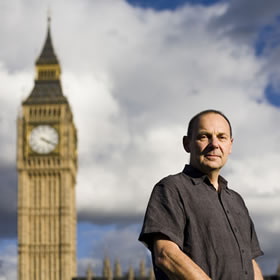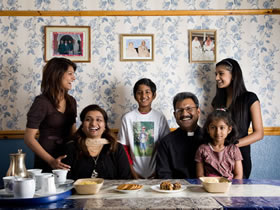01 January 2009
Who is your neighbour?
In November, the Alliance held a series of events to examine the concept of community in the light of immigration issues. Charis Gibson reports...
"Don't be a stranger." Many of us will have said this affectionately to our families and friends as we parted company from them after the Christmas holidays. But Jesus doesn't ask us just to love those we would naturally share Christmas dinner with. Instead, He challenges us to re-evaluate who our neighbours are and to welcome those we consider strangers.
The Alliance's annual Temple Address in November, along with the accompanying photographic exhibition, website and other events, was a chance to remind ourselves of the Judeo-Christian injunction to help the stranger. Migration is one of the biggest media and political issues facing Britain today, and many Christians told us stories about how they are helping, supporting and loving these new neighbours.
Church and integration
Filling out forms, negotiating with landlords, even understanding basic English - churches who work with migrants are discovering how huge these obstacles can be for them.
Major David Blowers, from the Salvation Army in Margate, works with Czech and Slovak migrants, particularly Roma, teaching English or helping them fill in forms to being on the streets with them. "Sometimes the problem is simply that they don't speak English well enough to get everything sorted out," he says. "Sometimes it is a cultural thing or sometimes not understanding the system. We give a lot of advice."
In Northern Ireland, a crossdenominational group of Christians came together in 2001 to found the organisation Embrace, which promotes a positive response to migrants. Rev Richard Kerr, a Presbyterian minister and Embrace committee member, says, "People's views on refugees and asylum seekers are often more informed by The Daily Mail than the Bible. We try and get Christians to think about their responsibility to the people coming into our communities. It is about being welcoming, but not with our eyes closed. We are aware that sometimes people do abuse the system."
Mavis Henry, a nurse from South Africa, was imprisoned by immigration authorities when she first arrived in Northern Ireland, because of problems with her visa. On her release, she stayed with Christians, including Richard's family, for a few months while she got on her feet.
"Christians fight for our human rights as a person and embrace you as a person," she says. "How many people have strangers in their homes when they don't know anything about them? They took that risk when they took me in - they didn't know me - that is being a Christian."
Church and community
"The church was influential in us settling in," says Phuoc Tan Diep. "They were a God-send. They came and gave us clothes and whatever we needed. We didn't have anything; it was an empty house. It was amazing. We went to church and there was a lot of support and help from them. Our only family holiday was the Lake District, and they provided it for us."
Phuoc was just 3 years old when his family fled war-torn Vietnam, arriving in Wolverhampton in 1978, but the church's kindness to his family made a lasting impression.
Nelu Balaj arrived in the UK from Romania as a student in 1992 and is now the racial justice officer for Action of Churches Together in Scotland. "We have been working with migrant Christians and ethnic minority churches to help people feel at home in their churches," he says, "because a lot of people want to work and be a part of the scene in the church in the UK, but they don't know how to. We believe it is essential to help them feel empowered as equal partners with so-called traditional churches."
The Alliance, along with European Christian Mission, Fellowship of Churches of Christ in the UK and Global Connections, is currently consulting with the Polish Evangelical Alliance and English churches and agencies involved with Polish migrants.
Dr Krish Kandiah, the Alliance's Churches in Mission executive director, says, "We want to resource UK churches so that they can support Polish workers here, and to start a conversation between British and Polish churches to examine how we can forge better links with each other."
Church and worship
We may all be worshipping the same God, but when migrants arrive in the UK they can soon find the different expressions of worship an extra culture shock, especially if they can't understand what's being said.
Christians across Britain are working out their own ways of accommodating new cultures of worship. Rev Irfan John, who works with ethnic minority congregations in Wales for the Methodist Church, recently started Cardiff's first Urdu worship service.
"I prefer to worship in an Urdu worship service rather than an English one, because I understand my own language 100 per cent, and English is my fourth language," he says.
Wesleyan Christian Centre pastor, Rev Elson Parris, may be a Barbadian living in North London, but that doesn't stop him also overseeing a Portuguese congregation. The church has an English service in the morning and a Portuguese one in the evening, with a monthly joint celebration.
 "We help them to integrate by having the different services, which helps them get used to the surroundings and the different culture and cultural mix," he says. "We try to create an atmosphere where each culture can engage and enjoy each other."
"We help them to integrate by having the different services, which helps them get used to the surroundings and the different culture and cultural mix," he says. "We try to create an atmosphere where each culture can engage and enjoy each other."
Church and advocacy
Working with asylum seekers proved to be a watershed for Dave Smith in terms of his attitude to campaigning. "I was fairly non-political until this issue came up for me," he says. "I then realised that Christians need to be political beings as well as spiritual ones. Jesus never made a distinction; nor should we. He was very political and challenged the rulers of His time."
Dave is director of the Boaz Trust, which supports asylum seekers in the North West of England. As well as giving practical care, Boaz promotes justice for asylum seekers and refugees and campaigns for changes in asylum legislation to make it easier for asylum seekers to get legal aid.
The Boaz Trust is one of the organisations the Alliance met with in 2007 before compiling a report on asylum using evidence from translators, pastors, asylum seekers and transcripts of asylum interviews and legal appeals.
That report, Alltogether for Asylum Justice, highlights the difficulties faced by people claiming asylum on religious grounds. The report includes advice for church leaders and provides guidance for MPs and their case workers, to give them a better understanding of asylum claims on religious grounds.
Rev David de Verny, a former Church of England chaplain to migrant workers in Boston, Lincolnshire, believes passionately that Christians must take action on injustice. "We don't have any national, well-known figures that speak out on behalf of migrant workers," he says. "And that is where I think the churches must lead. Otherwise, we betray Jesus."
Church and evangelism
"Christians need to recognise that we are a family, born and created in the image of God," says Rev Arlington Trotman. "That is our common identity. Regardless of culture, colour, political or religious background, we are one people under God."
As a Methodist minister, Arlington has been working on migration, asylum and racial justice issues for more than 10 years, and runs the Churches Commission for Migrants in Europe. His words reflect the motivation that drives Christians across the country to serve, welcome, fight for and honour the migrant in their communities.
Major David Blowers says that in Margate, social action came first, followed by evangelism. "There were people who trusted us and more people who would come and ask us questions, and we were able to help them," he says. "The only thing we were not providing was any church for them or any situation where we would preach the Gospel. It seemed we were introducing them to a lot of government agencies, but not really introducing them to Jesus. So we took that to our established church eldership."
The eldership gave them the support to set up a Czech speaking congregation.
Mahron Ehata, originally from the Democratic Republic of Congo, was helped by the Boaz Trust on his arrival in England. "Dave Smith and another worker called Mark saw that I was depressed and asked if they could pray with me," he says. "They also gave me soup to eat and some shoes. This moment really brought me back to a belief in God."
You might also be interested in
- 29 Jun 2018 Welcome the stranger as if they’re royalty
- 28 Jun 2018 idea: In the heart of the inner city
- 28 Jun 2018 idea: Caribbean communities’ contribution to the UK
- 27 Jun 2018 idea: Languages of Love
- 24 Apr 2018 idea: A union that transcends differences

